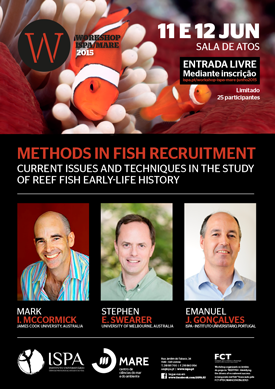Methods in fish recruitment - Current issues and techniques in the study of reef fish early-life history

Workshop -Methods in fish recruitment - Current issues and techniques in the study of reef fish early-life history
Workshop MARE | ISPA
Quinta, Junho 11, 2015 - 09:00
Sala de Atos
Irá realizar-se nos próximos dias 11 e 12 de Junho de 2015, entre as 9.00h e as 18.00h em ambos os dias, um workshop subordinado ao tema Methods in fish recruitment - Current issues and techniques in the study of reef fish early-life history, realizado pelo ISPA e o MARE - Centro de ciências do mar e do ambiente, no âmbito do projecto “REEFFISH - Identifying the drivers of recruitment success in temperate reef fish” financiado pela FCT (PTDC/MAR-EST/4356/2012).
A entrada é livre mas limitada a 25 participantes e a inscrição prévia.
Deverá juntar meia página de texto com a intenção de participação no mesmo, assim como, uma descrição da sua actual actividade profissional/Académica. A decisão final dos participantes escolhidos será tomada a 5 de Junho de 2015 e notificada aos seleccionados.
Este workshop contará com a presença de:
Mark McCormick
Full Professor at the ARC Centre for Integrated Coral Reef Studies, and the College of Marine and Environmental Sciences, James Cook University, Australia. He has been studying fish communities on temperate and tropical reefs for almost 30 years, and is a world expert on the early life history of fishes, producing over 200 research papers. He has been funded extensively through the Australian Research Council to examine the processes that regulate the numbers and distribution of fishes on today’s reefs, and those we may see in the future. His research has focused on the interconnections between fish life-stages; from how environmental change affects parents and their larval offspring, through to who survives the gauntlet of mouths as the larvae return to reefs to become breeding members of the fish community. Currently, Mark still manages to spend 3 months of the year underwater and is kept busy by the 20 post-graduate students he supervises.
Stephen E. Swearer
Associate Professor of marine biology at the University of Melbourne, Australia. He leads the estuarine fish and pollutants group in the Centre for Aquatic Pollution and Identification (CAPIM). He is an internationally recognized fish and fisheries ecologist, whose research on larval dispersal spearheaded a paradigm shift in our understanding of how populations of marine animals are replenished and how they should be managed and protected. His current research is informing water, pollution, and fisheries management policy by identifying the primary causes of extinction vulnerability in coastal marine ecosystems.
Emanuel J. Gonçalves
Associate Professor at ISPA – Instituto Universitário (Portugal) and is the President of the Board of ISPA CRL, the cooperative that runs the Institute. Is Vice-Director of MARE – Marine and Environmental Sciences Centre, a large center which includes 6 universities and 4 former research centers. His research interests are marine conservation, marine ecology and connectivity in marine ecosystems, behaviour of marine animals, larval ecology and recruitment processes. He is a member of the National Council of Environment and Sustainable Development (Portugal).
PROGRAMA DO WORKSHOP
11 DE JUNHO DE 2015 > 9.00H - 18.00H
INTRODUCTION – Overview of carry-over effects
PART 1 – Sampling principles
General issues associated with sampling in the marine environment
Role of experimentation, designs and pitfalls
PART 2 – Early life history (ELH) stages- what do we know and stage-specific sampling
Marine population dynamics and the importance of ELH
Developmental stages of fishes - Sampling and methodologies associated with the ELH of fishes (parental effects, fertilization dynamics and embryos, larvae characteristics and significance, different hypothesis on recruitment controls)
12 de JUNHO DE 2015 > 9.00H - 18.00H
PART 2 - Continued
Sampling larvae
I. Morphometrics and body condition – measures and analysis.
II. Examples of the utility of using otoliths
1. Otoliths as an ageing tool
2. Otoliths as a history of growth
3. Otoliths as an insight to environmental history
III. Behavioural studies in fish larvae - performance and behaviour
IV. Metamorphosis and settlement – maturation of sensory systems and recruits competence
1. Metamorphosis as a central transition in fish – anatomical, behavioural and physiological changes
2. Behavioural studies in recruits and juveniles (boldness vs shy, personality, habitat choice, lateralization, burst-speed, competition, predation)
PART 3 – Discussion of research questions from workshop participants
(Participants may bring case studies for discussion and analysis)
Horários e Contactos
Contactos
Tel: 218 811 785 (ext. 450)
Email: gai@ispa.pt
Morada
Rua Jardim do Tabaco, 34
1149-041 Lisboa